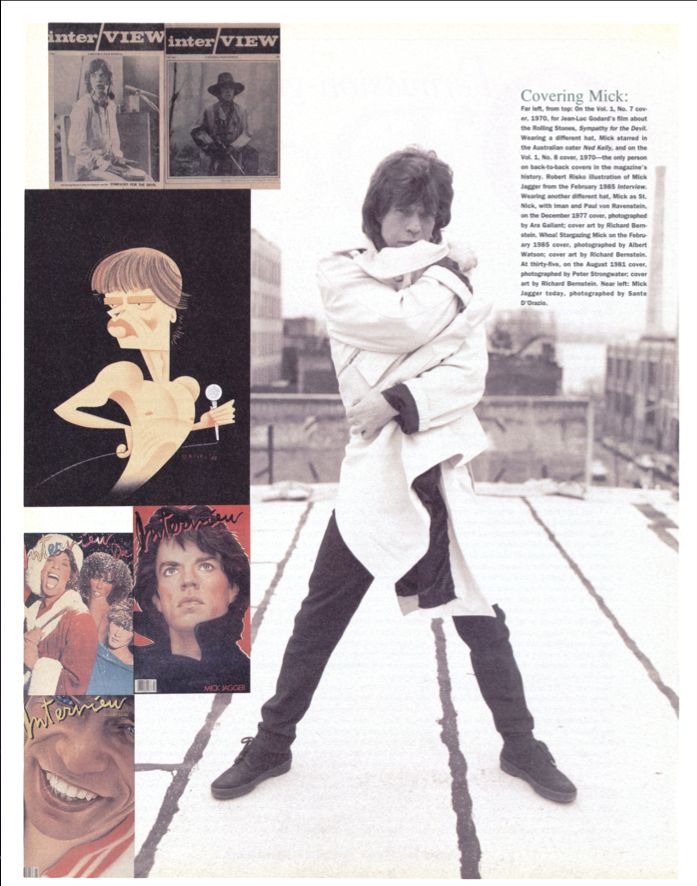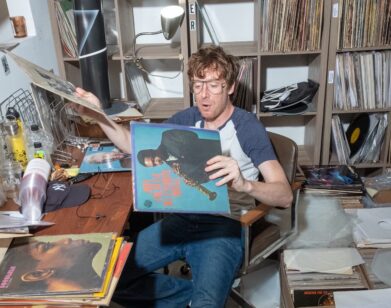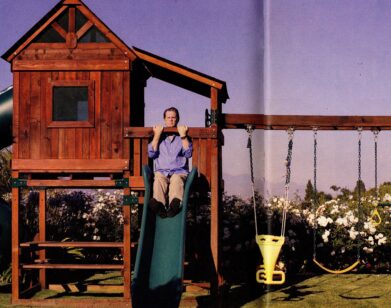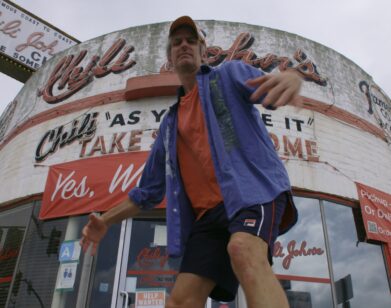Time is on Our Side: A Look Back at The Rolling Stones
Like a favorite pair of blue jeans, the cabaret was a place where people felt comfortable. To celebrate their 10-year anniversary, Hudson Jeans have adopted this free-spirited mentality with the launch of the “Hudson Cabaret” —a tribute to pushing past the boundaries and living a life free of inhibition. Always a fan of self-expression, anniversaries, and bon-vivant, Interview searched our archives for our favorite moments with the most rebellious and denim-loving subjects; those who stray from the usual rules of society and “let themselves go.”
The trope of the “bad boy” has existed for a long time, but sometimes it feels as though the term was invented for Mick Jagger and the Rolling Stones. Pouting lips, eyeliner, tight trousers, and swaggering hips: the Stones certainly know how to let themselves go. Even if their partying has slowed somewhat over the past few decades, Mick, Keith, and Ronnie remain synonymous with rebellion—they did, after all, right a song called “Sympathy for the Devil.” We’ve met the Stones, and frontman Jagger in particular, many times over the years to discuss everything from punk rock to politics, Studio 54, famous friends, haircare, and things to not before traveling along the Amazon. Here, we assemble some of the highlights of nearly 40 years of friendship.
AGES: Mick Jagger: 69; Keith Richards: 68; Ronnie Wood: 65; Charlie Watts: 71.
HOMETOWN: London, UK
THE BLUES: Mick Jagger: I suppose in a way I was seduced into this whole music shenanigans by blues singers. It’s a very odd thing, to be seduced. But between Elvis Presley and Muddy Waters, I was seduced into having a lifetime of music instead of a lifetime of I-know-not-what. So it’s all their fault. [Mick Jagger, December 2001]
THE POWER OF MUSIC: Jagger: Music does have a very visceral power. It can be very emotive. And it doesn’t have to be great music to move you emotionally. In general, though, I don’t think music has the depth of [a Raphael painting or great poem by Keats or Baudelaire]. It’s not supposed to [Now, Mick!, October 1994]
ORIGINAL MELODIES: Jagger: I don’t believe in original melodies. There are only so many computations of eight notes. [A Stones Tea, December 1977]
RECORDING STUDIOS: Keith Richards: They’re like Holiday Inns. [A Stones Tea, December 1977]
MANAGERS: Jagger: They all look like Brian Ferry. [A Stones Tea, December 1977]
PUNK ROCK: Jagger: Some’s rubbish and some’s great. I think in England it’s much more of a real thing that it is here. I think here, it’s kind of like an affectation. In London you got all these kinds that are really out of work, you know, they got nothing else to do but play in rock groups. Rather similar to us. [A Stones Tea, December 1977]
THE EVOLUTION OF SHOCK VALUE: Jagger: People always think of the ’50s as the most static period, but the reality was very different. There was a genuine “fuck you” attitude in the ’50s and early ’60s. After that, I think it just became a pose. But in the early, early days, there was a real statement to make, and as a very young teenager I wasn’t even old enough to be making the statement myself. [laughs] I mean, it was so easy to shock people in the ’60s. We didn’t even intend to shock people when we started out. We thought we were normal. [laughs] Whereas now—although you want society to be more tolerant—it’s much more difficult to shock people. But it’s rather nasty to do that without relating it to anything else, to shock people for the sake of it. [Mick Jagger, December 2001]
SEX: Jagger: I don’t think there’s anything wrong with having sex, you know. [A Stones Tea, December 1977]
THE SEX PISTOLS: Richards: They look great. That’s all that matters.
Jagger: I think even Sid Vicious is basically a nice guy, but Johnny Rotten keeps talking bad about me. He’ll get his rotten teeth kicked in one day.
Richards: They’re fucking just asking for it if they always insist on catching public transport on the way home for their gigs.
Jagger: They still live with their mums you know. Johnny Rotten says, “I still live with my mum, in a block of flats.”
Richards: I think his mum kicked him out. [A Stones Tea, December 1977]
MARIANNE FAITHFULL: Jagger: Did I think that was going to last forever? I don’t know, I suppose I might have done, that’s difficult to say now. [Mick Jagger, February 1985]
BIANCA JAGGER: Jagger: [Did I think that was going to last forever?] No… she wanted to get married, I didn’t. [Mick Jagger, February 1985]
JOHN LENNON: Jagger: He liked to go out, and when he wasn’t with Yoko he was going out a lot. We had a lot of really good times. And when he went back with her he sort of stayed in…”I can’t play now,” and I used to send notes up because I used to live in the building next door. [Mick Jagger, December 2001]
ANDY WARHOL: Jagger: The thing about Andy was—it was about two things. It was about heavy, heavy socializing, and yet he didn’t say very much [but he’d end up] getting it all down in his diary when he went home. And it was about him, collectively with the studio, doing these paintings and establishing these images. It was always funny because you’d get there and there’d by lots of Elizabeth Taylors, and hundreds of Maos. You’d think, Oh great, that’s this week’s output. You didn’t think anything much of it, that was what was happening, like you would go into a studio and hear someone do a song which would eventually be a classic, so to speak. But at the time, you’d just think, Yeah, OK, yeah. [Mick Jagger, December 2001]
PRINCE: Jagger: I like Prince very much. He’s really good. [Mick Jagger: Cocktails with Jerry Hall, Charlie Watts, Bob Colacello, & Andy Warhol, August 1981]
POLITICS: Jagger: No one wants to be President, do they? [Mick Jagger: Cocktails with Jerry Hall, Charlie Watts, Bob Colacello, & Andy Warhol, August 1981]
THE PRESIDENT OF THE UNITED STATES: Jagger: When I lost my virginity, it was Kennedy. [Mick Jagger, December 2001]
STUDIO 54: Jagger: I think one visit every two weeks is not overdoing it. [A Stones Tea, December 1977]
AMERICA: Jagger: I love America but I can’t spend the whole year here. I can’t afford the taxes… [Mick Jagger: Cocktails with Jerry Hall, Charlie Watts, Bob Colacello, & Andy Warhol, August 1981]
PARIS: Jagger: Paris is a nice town so we hope to have a nice time. [A Stones Tea, December 1977]
PARADISE: Jagger: You can’t see paradise. The beauty you see in the world is just the reflection of what paradise is.
TRAVELING TO THE AMAZON?: Jagger: Be careful on the Amazon, it’s very dangerous. The boats are really bad… It’s worth going but you don’t actually see a lot… you don’t see any animals though, just insects… Be careful when you go on those planes. Make sure the propeller is on properly… but they fly on the river so if you fall in it’s not so bad… Be careful, don’t swim in the river because there are these things that go inside your cock… pee upwards. Always pee upwards and always sit with your parachute on. [Mick Jagger: Cocktails with Jerry Hall, Charlie Watts, Bob Colacello, & Andy Warhol August, 1981]
HAIR MAINTENANCE ON THE ROAD: Jagger: Keith and Ronnie? They do it themselves. They’re always cutting it off in my bathroom and making a mess. [Mick Jagger: Cocktails with Jerry Hall, Charlie Watts, Bob Colacello, & Andy Warhol, August 1981]
ROLLING WITH THE PUNCHES: Jagger: One’s private or emotional life is not always one sort of upward graph it dips around. Things don’t always go according to plan. [Mick Jagger, February 1985]
THE MILLENNIUM: Jagger: From an artistic point of view, I feel hopeful because the beginning of the last century was, actually, very productive. There were a lot of new ideas that were burgeoning and, hopefully, that may happen again. Of course, what followed all the new ideas was this very nihilistic war. [laughs] So you don’t want history to repeat itself. But I do think that the end and beginning of centuries will undoubtedly produce something new, which is kind of an exciting thing. Not just in terms of music. [Now, Mick!, October 1994]
MOMENTS OF BLISS: Jagger: You have to learn—sometimes with great difficulty—that those moments are wonderful without actually thinking, This is a wonderful moment. As soon as you think it, the moment’s gone. You have to train yourself not to do that. [Mick Jagger, December 2001]
BABIES!: Jagger: The play period is very important because that’s when they learn things… that’s when they pick up stuff. Bang on xylophones, or play ball or bricks. And then putting them to bed, if you can, is very important. It gives them a sense of security when they see both parents putting them to bed at, at this age, having security, and fun, is very important. [Mick Jagger, February 1985]







